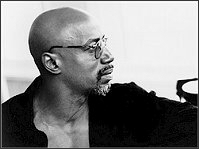 |
T.S. MonkDrums |
|---|
 |
T.S. MonkDrums |
|---|
"T.S. Monk has confidently made himself into a no-nonsense, hard-swinging jazz drummer and a strong leader who knows how to drive a band like crazy."
--Joe Klopus
T.S. Monk The recording debut of T.S. Monk is a significant event on several levels. It brings to the current jazz scene, via a new generation, a name that was known and respected world wide from the 1940s through the 1970s (The name is the same, technically it should be Thelonious III, since his grandfather, a guitarist, was the patriarch). But whereas Thelonious Monk was of course a pianist and composer who-devoted his entire career to jazz, Thelonious Jr., leader of the present group, is a drummer who detoured for many years into fusion and R&B before returning to the jazz world where he clearly belongs.
More significantly, Thelonious has assembled a band that is, to my mind, the best organized of its kind to emerge in the 1990s, with some of the most skilled soloists. Too many recent groups take the easy route: head, blowing choruses, back to head, often with over familiar standard tunes, or casual originals that merely serve as a point of departure for the soloists.
My first recollection of T.S. Monk goes back to 1970, at Shelly's Manne Hole in Hollywood, where he appeared with his father. We did not meet again until 1990, when I was in Washington to speak at one of the annual competitions sponsored by the Thelonious Monk Institute of Jazz, of which he is chairman.
Born Dec. 27, 1949 in New York City, T.S. Monk initially played trumpet and had some training on piano, but soon shifted to drums. "There was no pressure from the family," he recalls. "My father was allowed to choose music as his profession without any urging from outside, and he in turn allowed me the some choice; but being surrounded by famous musicians I inevitably decided to pursue a musical career."
Studying privately with Max Roach and Stanley Spector, T.S. played dance music with Top 40 groups around Now York before joining his father's group at age 20. "It was a trial by fire--he just come into the living room one day and said, 'Are you ready to play?' I thought he meant practice or rehearse, but he took me right over to a live TV show called 'Soul,' a Malcolm X birthday show as I recall. I worked steadily with him for two years, then off and on until he retired in 1975.
"From 1973-75 I was with a group called Natural Essence, and from 1974-76 I worked a lot with Paul Jeffrey, who had a quartet and a big band. Then I went right into R&B with my own band. We had some hits over the years with albums like House of Music and More Of The Good Life--I got kinda bogged down artistically, and I said to myself, I'm really not playing drums with this situation, and I really want to play some drums."
That this was a wise decision is eminently clear on this CD.
--LEONARD FEATHER, from the liner notes, Take One, Blue Note.
A selected discography of T.S. Monk albums.
| Find T.S. Monk on Amazon.com | Find T.S. Monk on eBay.com | |
|---|---|---|
| T.S. Monk CDs on Amazon | T.S. Monk CDs on eBay |
 Music |
 Home |
 Musicians |
|---|
|
Any comments, additions or suggestions should be adressed to:
The Hard Bop Homepage / Eric B. Olsen / ebolsen@juno.com |
Other Web Sites:
The Film Noir 'net A History of Horror The War Film Web Author Eric B. Olsen |